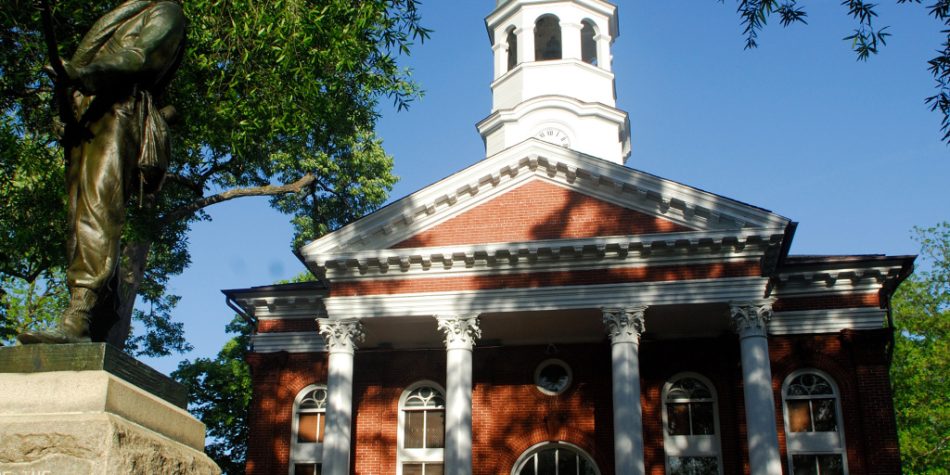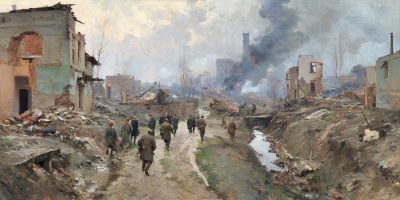Thomas Griffith, a former federal judge on the United States Court of Appeals for the District of Columbia Circuit, once said, “Disagreement is critical to the well-being of our nation. But we must carry on our arguments with the realization that those with whom we disagree are not our enemies; rather, they are our colleagues in a great enterprise.”
Is that how you feel about talking with your own political opposite? Not likely. But for reasons I will explain, below, I am certainly encouraged. In the increasingly polarized world in which we live, I am optimistic that we can find peaceful connections as we seek to resist demonizing those that think differently than we do. I am also confident that as we genuinely seek to understand and learn from those whose views differ from ours, we will find common ground in many cases, and humanity and goodness in almost all cases. Lastly, I’m also profoundly appreciative of the reality that as we seek to protect the rights of those who are different than we are, the protection of our own rights will be enhanced.
The conflict in our community. I live in Loudoun County, Virginia. Of late, our community has been a hotbed of contention, division, and rancor. Broadly, there has been vehement disagreement over masks and vaccinations, the addressing of racism in curriculum, policies about the treatment of our LGBT+ community, as well as a variety of other issues. In the wake of all this, I found myself very disturbed, but not by the fact that there was such strong division and such varied opinions. After all, right-thinking, rational people, given the same set of information, can come to vastly different conclusions. I was instead troubled by the tone, the anger, the unkindness, the incivility that arose from those holding different points of view. School board meetings, newspaper articles, social media posts, and other private and public communications were filled with accusations, affront, insults, and hatred. There was more than enough finger-pointing and demonizing to go around. The better angels of our nature were difficult to see.
Much of this conflict coalesced around Loudoun County Public Schools’ then-proposed policy 8040. Policy 8040 was the result of a Commonwealth of Virginia mandate for each school district to craft and implement a policy for the 2021-22 school year promoting equity and protection for LGBT+ students. Loudoun County developed a policy and then made it publicly available for both review and public comment. The public comment sessions during school board meetings were sadly circus-like. Commenters on both sides of the 8040 issue spoke passionately and often caustically, aggressively, and insensitively. Advocates of the proposed policy often cited the protection of all children in our schools. Opponents felt vehement that their own interests and those of their children were being ignored regarding these social issues, such as the use of student-selected pronouns and transgender use of bathrooms aligning with their identified gender. One meeting was cut short by the board as a result of the public not abiding by the rules of engagement. (Currently, there is an active lawsuit about this step of shutting down public comment.) There was a police presence and even some police activity. The whole process seemed to leave folks on all sides feeling divided and defeated. After the meeting, the rancor continued through newly organized advocacy groups, media interviews, social media, and the like. What a marvelous thing when the group that holds the majority of votes in some way is still interested in coming to the table to create unity, consensus, understanding, and improvement.
The community reconnaissance. We at the Community Levee Association began to talk about how we could bring some measure of civility—and then ideally some policy compromise—to the 8040 debate. We used a few methods—emails to school board members, social media posts, etc.—to seek to slow the process to give us time to find mechanisms for building unity among opponents. None of these efforts bore noticeable fruit. As a result, we at the CLA decided to try to sponsor some sort of meeting ourselves, one that brought stakeholders of all types to the table, hoping some sort of compromise would rise to the top. Despite our relative inexperience, we forged ahead optimistically, confident we could do some good. We also sought advice from participants in Utah’s Fairness for All effort, learning as we went along about how to build trust and then build consensus. We also sought guidance from good people who knew much about human behavior and how to build trust, especially among those who appeared to have nothing in common. We were ready to dive into relatively uncharted waters!
Our first item of business was to find participants willing to meet together and talk about issues with those that by all measures were opponents. A group of leaders from a local LGBT+ advocacy group agreed to attend. Several individuals affiliated with the religious right agreed to attend, including a right-leaning activist, as well as one typically conservative school board member. We developed an agenda that first sought to build trust, and next sought to specifically address proposed policy 8040. We met our first major obstacle upon sending out the formal invitation and agenda to all participants. Our LGBT+ friends were reluctant to meet with some of the named participants from the right due to a lack of trust that there would be openness and civility. Additionally, it became evident quite quickly that neither side knew whether to trust the CLA as the hosting institution. The idea emerged that we should hold two initial meetings—one between the CLA and the religious right folks and one between the CLA and the LGBT+ folks. Each side agreed to these two meetings.
One side note needs emphasis here. Because an LGBT+ protection policy was mandated by the Commonwealth of Virginia, it was virtually a given that some version of proposed policy 8040 would be passed by the school board. By all standards, the LGBT+ leaders had no need to meet with us, no quantifiable reason to need us, and no apparent evident benefit from dealing with, meeting with, or compromising with those with whom they disagreed. What an extraordinary message was sent when they agreed to meet, along with the conservative leaders—together demonstrating that conciliation, bridge building, and wise and honest compromise was the best way forward. These LGBT+ leaders especially are to be commended. What a marvelous thing when the group that holds the majority of votes in some way is still interested in coming to the table to create unity, consensus, understanding, and improvement. We were deeply thankful for all willing to participate with us.
The preparatory meetings. In June of 2021, the CLA met one morning, first with opponents of 8040, and then with advocates of that same policy. The first meeting had 3 CLA members and 4 community members (including one school board member) in attendance. There were some trust-building exercises held as we all got to know each other (as basic as “What’s a favorite childhood memory?” and “What would you consider a perfect meal?”), and then there was candid sharing of what each attendee’s interest was in the policy. It seemed that as each person spoke, they were being candid about their concerns. All sharing was civil and measured. Some wanted to broaden the discussion beyond policy 8040 and include other issues such as pandemic-related issues and critical race theory discussions. The CLA felt strongly that, in order to be effective, we needed to focus fairly exclusively on LGBT+ issues and policy 8040 and help both sides find common ground on this single issue. Also, because of the successful Utah model, we felt like we had some precedent and modeling to lean on. At this first meeting, many concerns were aired—the safety of “straight” children, bathroom safety for all students, the use of pronouns for transgender students, parental rights in LGBT+ situations, the allowance of those with religious beliefs not reflected in 8040 to be true to their convictions, and so on. We at the CLA learned much and were so thankful for the engagement and efforts of all who attended.
Almost immediately following the first session, the same 3 CLA members then met with 2 officers of Equality Loudoun, a prominent LGBT+ advocacy group in Loudoun County. This meeting followed the same pattern as the first. We shared our personal stories, built trust, and then spoke specifically about policy 8040. The folks attending this second meeting passionately and civilly expressed their strong desires to offer protections to the LGBT+ population in the school system. While we were unsure as to how they would speak of religion and religious protections, we learned much from them about their own sometimes positive religious experiences and about their hope that all interested parties could learn to find a way to protect all interests.
The big meeting. We at the CLA felt like these two meetings were a resounding success. The primary measure of that success was that, after holding these two sessions, our LGBT+ friends were now willing to come to the table, literally, to meet with those who opposed, on some level, proposed policy 8040. And so, we organized another meeting to be held in August 2021. We invited leaders from Equality Loudoun to represent those in favor of 8040, and we invited several new participants of a few different faiths to represent those with some objections to 8040. Because some of our earlier participants stated that they weren’t necessarily motivated by religious freedom, we sought to invite those who were, feeling like that most closely aligned with following Fairness For All principles.
August’s meeting was nothing short of amazing. There were 9 in attendance—3 from the CLA, 3 interested in protecting religious freedom, and 3 from Equality Loudoun. We followed fairly similar practices from our earlier meetings—trust-building exercises, inviting participants to explain what each one’s interest was in 8040, and talking about whether we had any common ground. Between each step, we went around the table asking each participant whether they felt sufficient trust to move on to the next agenda item. Each time, each was ready to move forward. When it came time to talk about common ground, all around the table agreed that we hoped to do what was best for children, for their safety, their learning, their dignity, their happiness. It became clear that there were many different points of view as to what that specifically meant and how it should be reflected in policy. There was a robust discussion about parental rights, student privacy, pronouns, bathrooms/locker rooms, school trips, and so on. As the hour grew late, we devised a simple plan. A Google doc was created where any participant could propose a change or amendment or improvement to 8040, and under each proposal, each participating individual and/or group was listed. We then voted on whether or not we could accept the proposal—yes, no, or with revision. Our time frame was short—the school board vote on 8040 was only a few days away. Additionally, we each agreed that we would only send along to the school board those items that received unanimous approval from those at our meeting. It is of significant note that this meeting ended with handshaking, hugging, and an abundance of goodwill between all participants. That alone, to me, is an extraordinary success. When I seek to protect your rights and you seek to protect mine, we both are benefited. And perhaps we can even become friends along the way.
The rest of the process played out fairly well. We at the CLA sent a letter to all school board members, sharing with them the process the CLA had used to find consensus and then offering to them our 8 unanimous proposals. At the August 2021 Loudoun County School Board meeting, 8040 was presented for a vote. The first of our 8 proposals was presented—and accepted into the policy! (This proposal was concerning improvements to school facilities increasing privacy for student bathroom use.) We were thrilled with this outcome.
I am not experienced in the slightest in working across significant disagreements in the public square. However, this experience has taught me that my optimism is not misplaced. We can get along. We can talk to each other. We can learn from each other. We can trust and respect each other. And in that talking and learning and trusting and respecting, good can come—important, real, and sustainable good. When I seek to protect your rights and you seek to protect mine, we both are benefited. And perhaps we can even become friends along the way.














